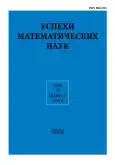Extrapolation of the Bayesian classifier with an unknown support of the two-class mixture distribution
- Authors: Lukyanov K.S.1,2,3, Yaskov P.A.4,5, Perminov A.I.1,3, Kovalenko A.P.6, Turdakov D.Y.1,3
-
Affiliations:
- Ivannikov Institute for System Programming of the RAS
- Moscow Institute of Physics and Technology (National Research University)
- Research Center of the Trusted Artificial Intelligence ISP RAS
- Steklov Mathematical Institute of Russian Academy of Sciences
- National University of Science and Technology «MISIS»
- Academy of Cryptography of Russian Federation
- Issue: Vol 79, No 6 (2024)
- Pages: 57-82
- Section: Articles
- URL: https://journal-vniispk.ru/0042-1316/article/view/281941
- DOI: https://doi.org/10.4213/rm10208
- ID: 281941
Cite item
Abstract
About the authors
Kirill S. Lukyanov
Ivannikov Institute for System Programming of the RAS; Moscow Institute of Physics and Technology (National Research University); Research Center of the Trusted Artificial Intelligence ISP RAS
Email: lukyanov.k@ispras.ru
Pavel Andreevich Yaskov
Steklov Mathematical Institute of Russian Academy of Sciences; National University of Science and Technology «MISIS»
Email: yaskov@mi-ras.ru
Scopus Author ID: 36635347000
ResearcherId: S-2745-2016
Candidate of physico-mathematical sciences
Andrey Igorevich Perminov
Ivannikov Institute for System Programming of the RAS; Research Center of the Trusted Artificial Intelligence ISP RAS
Email: perminov@ispras.ru
ORCID iD: 0000-0001-8047-0114
A. P. Kovalenko
Academy of Cryptography of Russian Federation
Email: a.p.kovalenko@yandex.ru
Denis Yur'evich Turdakov
Ivannikov Institute for System Programming of the RAS; Research Center of the Trusted Artificial Intelligence ISP RAS
Email: turdakov@ispras.ru
ORCID iD: 0000-0001-8745-0984
References
- A. Jishan, R. C. Green II, “Cost aware LSTM model for predicting hard disk drive failures based on extremely imbalanced S.M.A.R.T. sensors data”, Eng. Appl. Artif. Intell., 127 (2024), 107339, 11 pp.
- A. Caron, C. Hicks, V. Mavroudis, A view on out-of-distribution identification from a statistical testing theory perspective, 2024, 8 pp.
- Peng Cui, Jinjia Wang, “Out-of-distribution (OOD) detection based on deep learning: a review”, Electronics, 11:21 (2022), 3500, 19 pp.
- L. Devroye, L. Györfi, G. Lugosi, A probabilistic theory of pattern recognition, Appl. Math. (N. Y.), 31, Reprint of the 1996 original, Springer-Verlag, New York, 2013, xvi+636 pp.
- S. M. Djurasevic, U. M. Pesovic, B. S. Djordjevic, “Anomaly detection model for predicting hard disk drive failures”, Appl. Artif. Intell., 35:8 (2021), 549–566
- A. Farago, G. Lugosi, “Strong universal consistency of neural network classifiers”, IEEE Trans. Inform. Theory, 39:4 (1993), 1146–1151
- D. Hendrycks, K. Gimpel, A baseline for detecting misclassified and out-of-distribution examples in neural networks, 2016 (v1 – 2016), 12 pp.
- J. Jithish, B. Alangot, N. Mahalingam, Kiat Seng Yeo, “Distributed anomaly detection in smart grids: a federated learning-based approach”, IEEE Access, 11 (2023), 7157–7179
- A. Klein, Backblaze: Hard drive data and stats,
- Lingdong Kong, Shaoyuan Xie, Hanjiang Hu, Lai Xing Ng, B. Cottereau, Wei Tsang Ooi, “Robodepth: Robust out-of-distribution depth estimation under corruptions”, Adv. Neural Inf. Process. Syst., 36 (2023), 1–45
- Bo Li, Peng Qi, Bo Liu, Shuai Di, Jingen Liu, Jiquan Pei, Jinfeng Yi, Bowen Zhou, “Trustworthy AI: from principles to practices”, ACM Comput. Surveys, 55:9 (2023), 177, 46 pp.
- Jeremiah Zhe Liu, S. Padhy, Jie Ren, Zi Lin, Yeming Wen, G. Jerfel, Z. Nado, J. Snoek, D. Tran, B. Lakshminarayanan, “A simple approach to improve single-model deep uncertainty via distance-awareness”, J. Mach. Learn. Res., 24 (2023), 42, 63 pp.
- A. B. Nassif, M. Abu Talib, Q. Nasir, F. M. Dakalbab, “Machine learning for anomaly detection: a systematic review”, IEEE Access, 9 (2021), 78658–78700
- M. Perello-Nieto, T. D. M. E. S. Filho, M. Kull, P. Flach, “Background check: a general technique to build more reliable and versatile classifiers”, 2016 IEEE 16th international conference on data mining (ICDM), IEEE, 2016, 1143–1148
- R. Pinciroli, L. Yang, J. Alter, E. Smirni, “Lifespan and failures of SSDs and HDDs: similarities, differences, and prediction models”, IEEE Trans. Depend. Secure Comput., 20:1 (2023), 256–272
- K. Rasheed, A. Qayyum, M. Ghaly, A. Al-Fuqaha, A. Razi, J. Qadir, “Explainable, trustworthy, and ethical machine learning for healthcare: a survey”, Comput. Biol. Med., 149 (2022), 106043, 23 pp.
- Boxin Wang, Weixin Chen, Hengzhi Pei, Chulin Xie, Mintong Kang, Chenhui Zhang, Chejian Xu, Zidi Xiong, R. Dutta, R. Schaeffer, Sang T. Truong, Simran Arora, M. Mazeika, D. Hendrycks, Zinan Lin, Yu Cheng, S. Koyejo, Dawn Song, Bo Li, DecodingTrust: a comprehensive assessment of trustworthiness in GPT models, 2024 (v1 – 2023), 110 pp.
- Qibo Yang, Xiaodong Jia, Xiang Li, Jianshe Feng, Wenzhe Li, Jay Lee, “Evaluating feature selection and anomaly detection methods of hard drive failure prediction”, IEEE Trans. Reliab., 70:2 (2021), 749–760
- Hang Yu, Weixu Liu, Jie Lu, Yimin Wen, Xiangfeng Luo, Guangquan Zhang, “Detecting group concept drift from multiple data streams”, Pattern Recognition, 134 (2023), 109113, 11 pp.
- He Zhang, Bang Wu, Xingliang Yuan, Shirui Pan, Hanghang Tong, Jian Pei, “Trustworthy graph neural networks: aspects, methods, and trends”, Proc. IEEE, 112:2 (2024), 97–139
- Jing Zhang, Yuchao Dai, Mochu Xiang, Deng-Ping Fan, P. Moghadam, Mingyi He, C. Walder, Kaihao Zhang, M. Harandi, N. Barnes, Dense uncertainty estimation, 2021, 15 pp.
- Mingyu Zhang, Wenqiang Ge, Ruichun Tang, Peishun Liu, “Hard disk failure prediction based on blending ensemble learning”, Appl. Sci., 13:5 (2023), 3288, 22 pp.
- Zhilin Zhao, Statistical methods for out-of-distribution detection, PhD thesis, Univ. Technology Sydney, 2023, 107 pp.
Supplementary files








